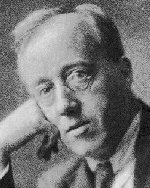Gustavus Theodore Holst (1874 - 1934)
Gustav Holst is recognized today as the composer of "The Planets," which
remains wildly popular, but for little else except perhaps his "St. Paul
Suite." However, Holst was the creator of operas, chamber, vocal, and orchestral
music of many different styles, based on subjects as varied as folk songs,
Tudor music, Sanskrit literature, astrology, and contemporary poetry. His
great interest in Eastern mysticism can be heard in his settings of Choral
Hymns from the "Rig Veda" and his short opera "Savitri."
 Gustavus
Theodore von Holst (he dropped the "von" in 1918) was born in Cheltenham,
England, in 1874. His grandfather, Gustavus von Holst of Riga, Latvia,
a composer of elegant music for the harp, moved to England and became a
fashionable harp teacher. Holst's father Adolph, a pianist, organist and
choirmaster, taught piano lessons and gave recitals; his mother, who died
when Gustav was only eight, was a singer. A frail child whose first recollections
were musical, Holst was taught to play the piano and violin, and began
to compose when he was about twelve.
Gustavus
Theodore von Holst (he dropped the "von" in 1918) was born in Cheltenham,
England, in 1874. His grandfather, Gustavus von Holst of Riga, Latvia,
a composer of elegant music for the harp, moved to England and became a
fashionable harp teacher. Holst's father Adolph, a pianist, organist and
choirmaster, taught piano lessons and gave recitals; his mother, who died
when Gustav was only eight, was a singer. A frail child whose first recollections
were musical, Holst was taught to play the piano and violin, and began
to compose when he was about twelve.
Holst met Ralph Vaughan Williams in 1895 while they were students at
the Royal College of Music, and the two remained lifelong friends, depending
on one another for support and assistance although there is little similarity
in their music. The two young men and their fellow students carried on
long discussions of self-criticism, philosophy, and, wrote Vaughan Williams,
"every subject under the sun from the lowest note of the double bassoon
to ... Thomas Hardy's 'Jude the Obscure'."
In those days of no royalties or performing fees, Holst found it impossible
to earn a living as a composer, so he took a post as a singing teacher.
Around 1904 he was appointed Musical Director at St. Paul's Girls' School,
Hammersmith, his biggest teaching post and one which he kept until his
death. Holst visited the United States twice, once to lecture at the University
of Michigan, and again for a six-month period as a lecturer at Harvard.
He died in 1934, four months short of his sixtieth birthday, after a
lifetime of poor health excacerbated by a concussion suffered in a backward
fall from the conductor's podium, from which he never fully recovered.
 Gustavus
Theodore von Holst (he dropped the "von" in 1918) was born in Cheltenham,
England, in 1874. His grandfather, Gustavus von Holst of Riga, Latvia,
a composer of elegant music for the harp, moved to England and became a
fashionable harp teacher. Holst's father Adolph, a pianist, organist and
choirmaster, taught piano lessons and gave recitals; his mother, who died
when Gustav was only eight, was a singer. A frail child whose first recollections
were musical, Holst was taught to play the piano and violin, and began
to compose when he was about twelve.
Gustavus
Theodore von Holst (he dropped the "von" in 1918) was born in Cheltenham,
England, in 1874. His grandfather, Gustavus von Holst of Riga, Latvia,
a composer of elegant music for the harp, moved to England and became a
fashionable harp teacher. Holst's father Adolph, a pianist, organist and
choirmaster, taught piano lessons and gave recitals; his mother, who died
when Gustav was only eight, was a singer. A frail child whose first recollections
were musical, Holst was taught to play the piano and violin, and began
to compose when he was about twelve.